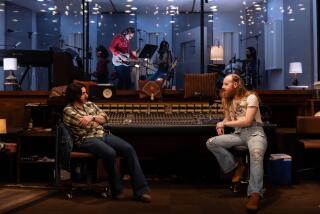The daring theater of ‘Prudencia Hart,’ ‘Penny Plain’
Playwrights today might settle all too readily for a stenographer’s role, but they have within themselves the power of gods.
Two recent unconventional theater productions offered welcome reminders that plays needn’t replicate the world but are free to construct alternative universes with landscapes and dialects all their own.
The National Theatre of Scotland’s “The Strange Undoing of Prudencia Hart,” at the Broad Stage’s Edye through Feb. 8, uses old Scottish ballads as inspiration for a modern-day folk tale exuberantly performed in a makeshift pub expressly designed for the occasion.
PHOTOS: Best classical concerts of 2013 | Mark Swed
“Penny Plain,” the dystopian puppet drama presented last weekend by UCLA’s Center for the Art of Performance at Macgowan Hall’s Little Theater, showcased the dark arts of Canada’s Ronnie Burkett Theatre of Marionettes in a piece that was like a hybrid of Armistead Maupin’s “Tales of the City” and the Book of Revelation.
Neither offering had any truck with realism. There are many roads to the truth. The wilder route may take you off-course, but sometimes you don’t know where you want to go until you get there.
“Prudencia Hart,” a music-infused ensemble work created by David Greig and Wils Wilson, swirls around tables that have been set up in the Edye for the audience to sling back whiskey. This rhyming tale revolves around the haughty Prudencia (Melody Grove), a young scholar from Edinburgh. Disdainful of her colleagues’ post-structural gobbledygook at an academic conference, she finds herself caught in surreal circumstances not unlike those of the heroines of the old ballads she has been studying.
PHOTOS: Faces to watch 2014 | Classical music
A fierce winter storm and some drunken revelry lead to an encounter with the devil, who takes her prisoner. But Prudencia shouldn’t be underestimated. Her devotion to the ballads has prepared her for such a test.
Her story celebrates a paradox of human nature — the proudly solitary yet inescapably communal character of our lives. The production could use some tightening. The final stretch devolves into silliness that is probably more fun for those heavily imbibing. But overall the insouciant theatricality is a refreshing antidote to all the plays timidly occupying the stage as though they’d rather be inside a TV studio.
Frolicking on the dividing line between civilization and barbarism, “Penny Plain” begins with news reports of a planet teetering on the brink of apocalypse. A pandemic rages and nature itself seems to be in revolt. Humanity, long ensconced at the top of Earth’s hierarchy, is in free-fall.
INTERACTIVE: High-earning conductors
Penny, a blind elderly woman who runs a boarding house filled with eccentrics, listens to the horrific evening news with her talking dog, who has decided it’s time to make a break with domesticity. Food shortages — he’s sick of her store of biscuits — aren’t the only thing compelling him to leave the safety of home for the outdoors, where his fellow canines are being cooked by starving humans.
Evaluated on old-fashioned playwriting terms, Burkett’s manner of storytelling is unwieldy. There are more characters than he can comfortably accommodate in his story. And the colorful clamorousness of his vocal delivery grows wearying.
But the puppet design is spectacular, the thematic material remarkably daring and the tale, I’ll confess, has been haunting my dreams for the last several nights. This marionette show definitely isn’t for children. But “Penny Plain” is a gift for adults longing for the sinister enchantment of audacious fables.
More to Read
The biggest entertainment stories
Get our big stories about Hollywood, film, television, music, arts, culture and more right in your inbox as soon as they publish.
You may occasionally receive promotional content from the Los Angeles Times.







